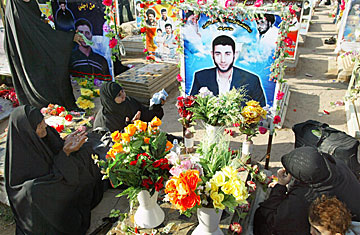
Iraqi women pray at the grave of a relative at the Martyr's cemetery in Najaf, Iraq.
As the United States prepares to launch what is ostensibly the final chapter in the U.S. military occupation of Iraq on January 1, a new report confirms a significantly lower civilian causality count for 2008 — along with a few caveats.
The report, released on Saturday by Iraq Body Count (IBC), an independent project that tallies statistics from NGOs and other groups, says that between 8,315 and 9,028 Iraqi civilians were killed in 2008. That compares to over 22,671 civilian deaths in 2007, and over 25,774 in 2006, according to the organization's tally. IBC has kept track of such numbers along with details of each incident since the 2003 U.S. invasion. Even so, the report cautions that the decline is only low in relative terms, and that attacks against civilians remain a serious problem. (See pictures of Iraq's streets coming back to life.)
Indeed, Iraq Body Count released its findings as a car bomb exploded near a bus stop in the Iraqi capital, killing 22 people, and wounding 54, according to the Associated Press. In a separate incident, a car bomb killed three in a town south of Baghdad.
The report contains another caveat: the 1,106 civilian deaths this year that relate directly to U.S. troop presence — meaning Iraqis killed by U.S. troops or those civilians killed in attacks carried out by insurgents targeting U.S. troops — has remained relatively unchanged since 2006. "While deaths caused by Unknown perpetrators [e.g. car bombs in marketplaces] have plummeted by 87% from the peak year of 2006, civilian deaths [caused by "Coalition military or those who violently oppose them"]... have remained relatively constant throughout the last three years," the report states. "What remains certain is that Iraq under occupation is fraught with dangers for the civilian population, dangers which will never entirely go away before the occupation does."
But with the Iraq's government gearing up to take the reins militarily in 2009, Iraqi officials across the political spectrum are seeing the glass as half full. "I assure you this number will drop sharply the moment the Americans withdraw their troops. That also goes for violence in general," says Ahmed Hassan al-Massoudi, a member of parliament aligned with radical Shi'ite cleric Muqtada al-Sadr. "I don't think 9,000 is a reason to worry, because you can see these numbers in other civilized countries," says Ahmed Bassam Mohammed, a police lieutenant and former member of an Awakening council in Baghdad. "For example in the United States you might have such numbers from murders and robberies."
The Awakening fighters were key to bringing down the violence in the last two years. This past fall, they were taken from U.S. military sponsorship and put under Iraqi government control. They are increasingly replacing Iraqi police as targets, despite the overall decline of violence, the report said. This year also marks the first in which civilian deaths outside of Baghdad outnumber those within the capital, a shift that Iraqi officials say reflects the fact that Iraq's largest city has become vastly more secure.
